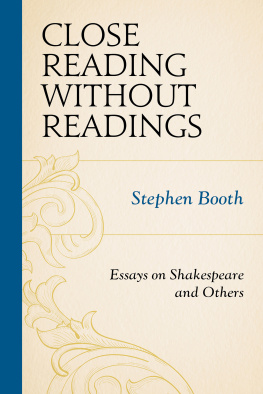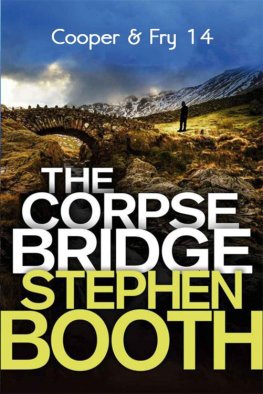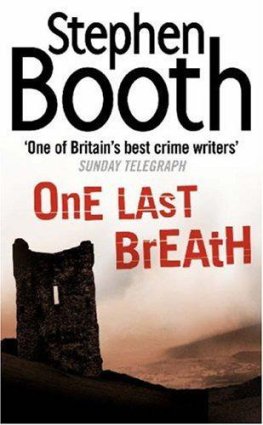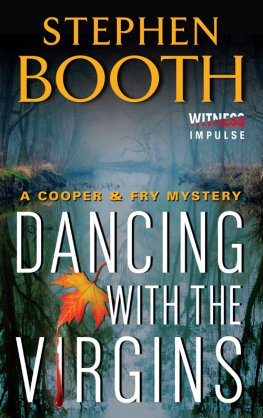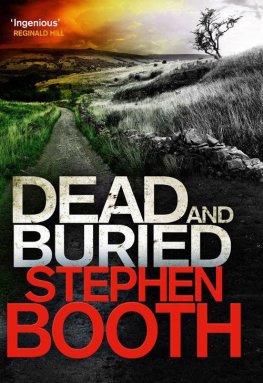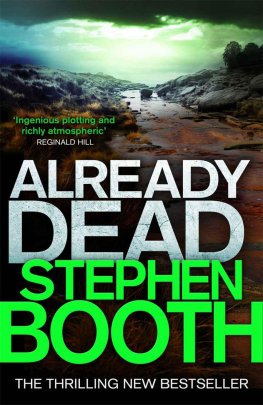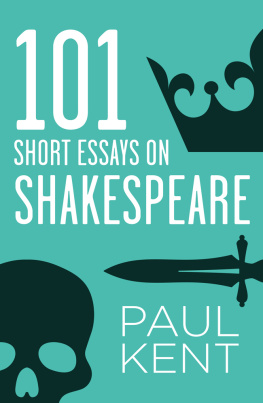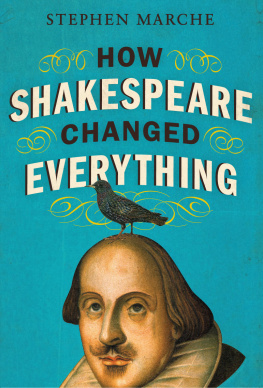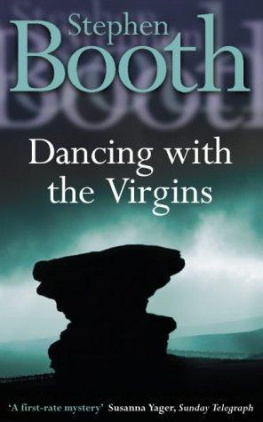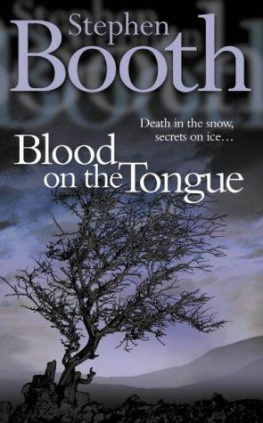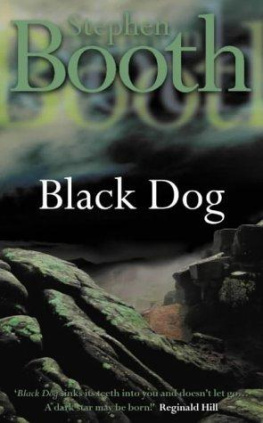Booth Stephen - Close reading without readings: essays on Shakespeare and others
Here you can read online Booth Stephen - Close reading without readings: essays on Shakespeare and others full text of the book (entire story) in english for free. Download pdf and epub, get meaning, cover and reviews about this ebook. City: Madison Teaneck, year: 2016;2015, publisher: Fairleigh Dickinson University Press, genre: Romance novel. Description of the work, (preface) as well as reviews are available. Best literature library LitArk.com created for fans of good reading and offers a wide selection of genres:
Romance novel
Science fiction
Adventure
Detective
Science
History
Home and family
Prose
Art
Politics
Computer
Non-fiction
Religion
Business
Children
Humor
Choose a favorite category and find really read worthwhile books. Enjoy immersion in the world of imagination, feel the emotions of the characters or learn something new for yourself, make an fascinating discovery.
- Book:Close reading without readings: essays on Shakespeare and others
- Author:
- Publisher:Fairleigh Dickinson University Press
- Genre:
- Year:2016;2015
- City:Madison Teaneck
- Rating:4 / 5
- Favourites:Add to favourites
- Your mark:
- 80
- 1
- 2
- 3
- 4
- 5
Close reading without readings: essays on Shakespeare and others: summary, description and annotation
We offer to read an annotation, description, summary or preface (depends on what the author of the book "Close reading without readings: essays on Shakespeare and others" wrote himself). If you haven't found the necessary information about the book — write in the comments, we will try to find it.
Booth Stephen: author's other books
Who wrote Close reading without readings: essays on Shakespeare and others? Find out the surname, the name of the author of the book and a list of all author's works by series.
Close reading without readings: essays on Shakespeare and others — read online for free the complete book (whole text) full work
Below is the text of the book, divided by pages. System saving the place of the last page read, allows you to conveniently read the book "Close reading without readings: essays on Shakespeare and others" online for free, without having to search again every time where you left off. Put a bookmark, and you can go to the page where you finished reading at any time.
Font size:
Interval:
Bookmark:
Close Reading without Readings
Close Reading without Readings
Essays on Shakespeare and Others
Stephen Booth
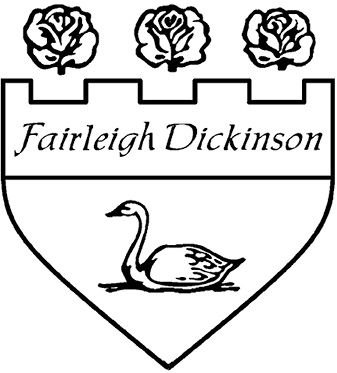
FAIRLEIGH DICKINSON UNIVERSITY PRESS
Madison Teaneck
Published by Fairleigh Dickinson University Press
Copublished by The Rowman & Littlefield Publishing Group, Inc.
4501 Forbes Boulevard, Suite 200, Lanham, Maryland 20706
www.rowman.com
Unit A, Whitacre Mews, 26-34 Stannary Street, London SE11 4AB
Copyright 2016 by Stephen Booth
All rights reserved. No part of this book may be reproduced in any form or by any electronic or mechanical means, including information storage and retrieval systems, without written permission from the publisher, except by a reviewer who may quote passages in a review.
British Library Cataloguing in Publication Information Available
Library of Congress Cataloging-in-Publication Data
Names: Booth, Stephen, 1933
Title: Close reading without readings : essays on Shakespeare and others / Stephen Booth.
Description: Madison, NJ : Fairleigh Dickinson University Press, 2016. | Includes bibliographical references and index.
Identifiers: LCCN 2015036134| ISBN 9781611478907 (cloth : alk. paper) | ISBN 9781611478921 (pbk. : alk. paper) | ISBN 9781611478914 (electronic)
Subjects: LCSH: Shakespeare, William, 15641616Criticism and interpretation. | Books and reading.
Classification: LCC PR2976 .B556 2016 | DDC 822.3/3dc23 LC record available at http://lccn.loc.gov/2015036134
 The paper used in this publication meets the minimum requirements of American National Standard for Information SciencesPermanence of Paper for Printed Library Materials, ANSI/NISO Z39.48-1992.
The paper used in this publication meets the minimum requirements of American National Standard for Information SciencesPermanence of Paper for Printed Library Materials, ANSI/NISO Z39.48-1992.
Printed in the United States of America
Contents
Foreword
This collection of essays by Stephen Boothseven of them published for the first timeadvances his distinctive readerly project. Reflective of his exhilarating, spirited, and inspiring contributions to Shakespeare studies during the last half-century, they challenge many of our core assumptions about literary texts and how to encounter them. As the title of this collection indicates, Booth does not read texts to settle their meanings, but to warn of the impossibility of settled meanings, since, in his view, a works resistance to interpretation is a chief source of its value. In doing so he may be said to exemplify, and indeed to pioneer, the practice of cutting-edge critical methodologies, notably deconstructionwhile typically refusing to engage in the abstract and often vitriolic debates about those approaches that unhelpfully engaged the profession.
Even in his first published book, The Book Called Holinsheds Chronicles (1968), Booth identified as parallels between the chronicler and the playwright their ability constantly to shift the perspective of a reader or audience from one set of principles for judgment to another. His essay On the Value of Hamlet (1969: republished here) continues his challenge to readers through its assertion that Hamlet is a play that makes sensethat satisfies deeplybecause it consistently withstands our efforts to make sense of it. And in that same year of lustrous achievements came An Essay on Shakespeares Sonnets (1969), in which he set out not to explain the poems but to discover what in them results in the reading experience they evoke (x). In 1977, Booth published his acclaimed edition of Shakespeares sonnets, aiming to give a modern reader as much as I can resurrect of a Renaissance readers experience of the 1609 quarto (ix)with the caveat that many of Shakespeares locutions must have made his first readers as uneasy as they make modern readers (xiv). Drawing on his extensive scholarly learning and critical acumen, delighting in wryness and paradox, Booth teases out and relishes a range of meanings in the sonnets, encouraging readers to do the same. In 1983 came King Lear, Macbeth, Indefinition, and Tragedy , in which he notes the ways Shakespeares refusal to fulfill generic promises, abide by patterns, provide finality, or keep characters within limits forces audiences to think in multiple dimensions and experience conflicted responses that enrich their experience of the plays. Succeeding years have produced work that further mobilizes the imaginations of readers and encourages their creative engagement with literary texts.
At the heart of Booths method is the practice of close reading, mainly, but not exclusively, in connection with the works of Shakespeare. Whether reading a passage from a play, a sonnet, a nursery rhyme, a song lyric, a childrens book, or a celebrated presidential address, Booth notices language patternsrepetitions, analogies, correspondences, echoes, overtones, and other ways in which the choice and the arrangement of words have an impact on the reader. For Booth, close reading does not aim at providing readings, for example, interpretations or meanings; his is a practice of attentiveness, of seeing how the words work upon the listening mind and how the listening consciousness comprehends without noticing (On the Eventfulness of Hero and Leander ).
Booths attentiveness to how language works is at variance with what most Shakespeareans (and others) know as literary criticism, which invokes context to illumine meaning or associates literary works with worthy purposes, the goal being to offer new interpretations. While Booths work has deep implications for criticism, he demonstrates his independence from critical fashion by avoiding debates about critical theory. Reverential concerning poetry, which he considers exciting, ennobling, valuable, and wonderful, Booth describes literary criticism, by contrast, as dull and substantively trivial (Poetic Richness: A Preliminary Audit). His own practice of close reading notices how , why , and in what ways Shakespeares works affect his readers. The one Shakespearean question I care about, he has written, is What does Shakespeare do for his clients [readers] that makes him so special? And my basic answer... is that, most of the time, what he does is, in one way or another, beautiful (Deviation, Variation, and Variety in Stanza 1 of Venus and Adonis ).
To make beauty the highesteven the onlystandard of value puts Booth at odds with modes of criticism that require suspicious reading, that ask consumers of art to unmask an authors complicity with the dominant (and generally malign) forces of his or her daypatriarchy and colonialism, hegemony, gender bias, racism, and other political evils. To value the aesthetic as a prime value, to apprehend the text in an uncritical manner, requires being complicit with a text as an object of beauty. On this issue, Booth declares his loyalties readily and easily. Readers may disagree with the premises of a literary work even as they submit themselves, knowingly or not, to its effects.
A broader question, which Booth raises in an era dominated by critical practices that are political, sociological, ideological, or theoretical, deals with an even more fundamental matter: what we value in literature. His answer is the experience . He has devoted his own work to recognizing the literary experience, attending to its nature, mechanics, and function, and teaching others to do the same. Booths goal is not to uncover hidden meanings but to reveal how a word, a phrase, or a passage finds its way into the readers mind.
But Booths Shakespeare is not simply a benevolent supplier of beauty, plying his craft for our delight. Rather, he has designs on us; he is a manipulator, tester, and joker who deliberately embarrasses, even humiliates, us by making us believe in impossibilities and absurdities that we are unwilling to swallowand should not. There is mischief in Booths Shakespeare, who most resembles Shakespeares own Richard III. Like that usurping master of manipulation, Booths Shakespeare enjoys victories of rhetoric over circumstance (The Acquiescent Audience). In the wooing scene of Richard III , for example, we are made to play Lady Anne to Gloucesters adept Shakespeare, who makes us accept, admire, and even revel in the outrageously improbable. Whatever Shakespeares head game, Booth believes that the triumphs of artistswriters, composers, painters, sculptors, performersare as enablers of triumphs in their audiencesreaders and lookers and listeners (Faith in The Winters Tale and Faith in The Winters Tale ).
Next pageFont size:
Interval:
Bookmark:
Similar books «Close reading without readings: essays on Shakespeare and others»
Look at similar books to Close reading without readings: essays on Shakespeare and others. We have selected literature similar in name and meaning in the hope of providing readers with more options to find new, interesting, not yet read works.
Discussion, reviews of the book Close reading without readings: essays on Shakespeare and others and just readers' own opinions. Leave your comments, write what you think about the work, its meaning or the main characters. Specify what exactly you liked and what you didn't like, and why you think so.

